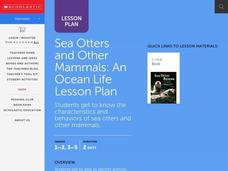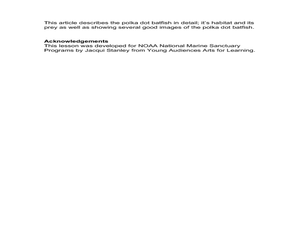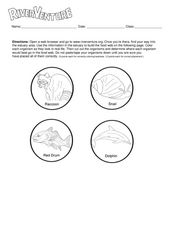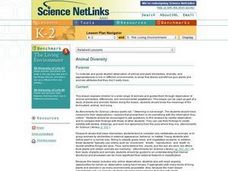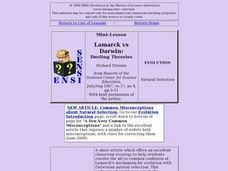Curated OER
Science Italian Style: Eruption!
Young scholars explore ways scientists prepare for a volcanic eruption. They observe films of earthquakes, oil spills, volcanoes and hurricanes. Students perform activities to demonstrate the relationship of viscosity to lava flow. ...
Curated OER
Ocean Life
Young scholars identify marine mammals according to specific characteristics. Students read about marine mammals and list their characteristics. Next, young scholars play a Whale and Otter game on the playground to simulate whales...
Curated OER
Reading: Birds and Animals in the Mirror
In this pronouns practice reading comprehension worksheet, students read a 6-paragraph passage and then respond to 10 true or false questions.
Curated OER
Forest Habitats
In this identification lesson, 3rd graders view photographs of different kinds of forests, learn where forests are located, and discuss seasonal changes in forests. Students read Look What I Did With a Leaf, collect leaves, identify what...
Curated OER
Animal Games
Students explore a variety of games on the Internet that will teach them about animals; they focus on the Florida panther. Students choose the activity that is of interest to them, and then rotate between the games online and the games...
Curated OER
Drawing Fish
Students practice creating art by imitating the camouflage of fish. In this animal characteristic lesson, students identify certain fish and their ability to change colors in order to survive in the wild. Students utilize coloring...
Curated OER
Stress, Coping and Health
In this psychology worksheet, students complete 5 short answer questions on possible reasons for stress and how to cope with it.
Curated OER
River Venture
In this food web worksheet, students color 4 animals and put them in the correct spot on a food web. They answer 3 related short answer questions.
Curated OER
Parts of a Plant
Students explore biology by listening to an in-class lecture. For this plant science lesson, students sing songs with their classmates regarding anatomical parts of a plant and create plants from arts and crafts materials. Students...
Curated OER
The Lost World (4 parts)
Tenth graders view this science fiction adventure, though not scientifically accurate, creates opportunities to explore the extinction of dinosaurs and to explore evolution.
Curated OER
Primary & Secondary Colors
Young scholars gain the knowledge of how to create color/s. This is relevant in their lives as they will forever be exposed to color and learning to identify how color is created.
Curated OER
Rx Rainforest:
Students identify plant diversity in the rainforest and the role that animals and habitats play in scientific research. They differentiate between natural habitat and laboratory research and work collaboratively to produce a video news...
Curated OER
Who's Coming to Dinner?
Students identify the role predators/prey play in food chains, differentiate between food chains and webs, identify factors that affect the balance in food webs, and propose solutions to protect endangered species' environments and...
Curated OER
Animal Diversity
Students use the Animal Diversity E-Sheet to access the Where Can Animals Live? online book.
Curated OER
Seeking a Balance in International Trade: Pacific Rim Import-Export Transactions Activity
Twelfth graders explain the concepts of marketing, comparative advantage and the uses of monetary policy to affect markets.
Curated OER
The Spider Beside Her
Second graders expand their knowledge of spiders. By creating a model of a spider, 2nd graders recognize differences between spiders and insects and determine that a spider is not an insect.
Curated OER
Flour Beetles
Learners observe life stages in flour beetles and graph the results. They write a summary report.
Curated OER
Lamarck vs Darwin: Dueling Theories
Students, in groups, study cheetah, blind cave organisms, and naked mole rats to explain facets of evolution.
Curated OER
Animal Diversity
Students examine plants and animals for their similarties and differences. They are read stories and note how the animals in the stories do not have the qualities that real animals have. They complete a worksheet to end the lesson.
Curated OER
Bats, Bats, Everywhere!
Students research information on bats while working in cooperative groups. They design posters with the information from their research.
Curated OER
Seed to Market
Students research using a variety of materials and technology. They explain the specifics of growing crops. They use mathematics in common business calculations.
Project SMART
Dinosaur Trek
Second graders investigate dinosaurs. They explore various websites, submit questions to a paleontologist online, construct cut and paste model dinosaur skeletons, develop a graph to compare dinosaurs, and label pictures from online...
Curated OER
Screwing Courage in Macbeth
High schoolers read, analyze, and act out the scenes 1.7.29-79 of the William Shakespeare play, "Macbeth." They discuss motivation, tactics, and obstacles, and improvise scenes suggested by the class.
Curated OER
Plants and Animals of Great Bay Animals and Plants of the Estuary
Students participate in a webquest about the plants and animals that inhabit an estuary. They role play as environmentalists researching this habitat and present the results of their research in a creative way.



